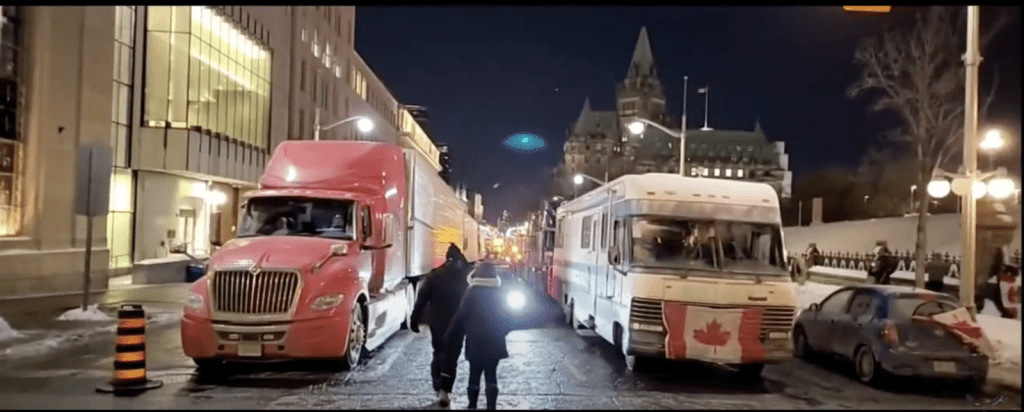
It was all so… Canadian.
On Friday, Feb. 17, Ontario Appeal Court Judge Paul Rouleau released his Public Order Emergency Commission Report, the blandly named, legally mandated, historically consequential results of his 10-month inquiry into last winter’s controversial convoy protests and — more to the point — whether those protests justified Justin Trudeau’s decision to invoke the never-before invoked Emergencies Act to bring them to an end.
Under that 1988 act, a national emergency means a temporary, urgent, and critical situation that endangers Canadians and exceeds the capacity of a province to control. Additionally, the law notes that such an emergency cannot be effectively dealt with under any other law of Canada. Oh, and once the emergency ends, there must be a public inquiry to determine whether its invocation was legitimate and necessary.
Hence, the Rouleau report.
Commissioner Rouleau’s inquiry was a massive undertaking. He examined 85,000 documents, including some that might otherwise have been classified, interviewed 139 witnesses, consulted with 50 experts, and presided over 31 days of public hearings featuring 76 witnesses, including protestors, local residents, police, public servants, even the prime minister himself testifying under oath.
Just under 300 days later, the result is a five-volume report so massive — 2,092 pages — that it required its own book-length 273-page executive summary.
Rouleau’s bottom line? “After careful reflection, I have concluded that the very high threshold required for the invocation of the Act was met,” he declared in a public statement following tabling of his final report in parliament last week.
“When the decision was made to invoke the Act on February 14, 2022, cabinet had reasonable grounds to believe that there existed a national emergency arising from threats to the security of Canada that necessitated the taking of special temporary measures. When the record is viewed as a whole, the inference connecting the protests to threats of serious violence and the achievement of political or ideological objectives is readily and reasonably available.”
But…
And here is where it gets… well, Canadian in the best possible way.
Rouleau also allowed that he had come to his determination “reluctantly…”
I do not come to this conclusion easily, as I do not consider the factual basis for it to be overwhelming… Reasonable and informed people could reach a different conclusion than the one I arrived at.
Reasonable and informed people… reach a different conclusion…
Rouleau’s equivocation may stem, in part, from his recognition that invoking the act only finally became necessary after governments and the police failed to properly prepare for or understand the forces at play among the protestors.
Had various police forces and levels of government prepared for and anticipated events of this type and acted differently in response to the situation, the emergency that Canada ultimately faced could likely have been avoided. Unfortunately, it was not.
The fact is, as Rouleau is quick to note, the protests themselves were a legitimate, constitutionally protected expression of the frustrations some Canadians felt because of COVID restrictions, mask mandates, etc.
The complication was that “ideologically motivated extremists,” multiplied by social media “served as an accelerant for misinformation and disinformation,” and “diminished the prospects of productive discussions” between the government and the protestors.
Justin Trudeau himself didn’t help. Rouleau says the prime minister was “wrong” to call out the protesters generally as a “fringe minority” whose views were “unacceptable.” That only exacerbated tensions. (Trudeau himself has since acknowledged that Rouleau was right about that.)
To further complicate matters — leading to what Rouleau called a “failure of federalism” —an election-bound Ontario Premier Doug Ford did his best to shunt responsibility, and blame, for the crisis onto the federal government. The Ontario government, Rouleau wrote acidly, “could have also provided the people of Ottawa with a clear message that they had not been abandoned by their provincial government during a time of crisis.” It failed.
It was those failures upon failures, Rouleau suggests, that allowed the social media-amped protests to get so out of hand that there was, in the end, no choice but to use the federal government’s emergency powers to regain control of the situation.
I think he’s right.
But I also agree with Rouleau that “reasonable and informed people could reach a different conclusion.” We are bound to hear more from groups like the Canadian Civil Liberties Association and others. And that’s good — and Canadian — too.
The real test of Justice Rouleau’s report and its 56 recommendations — on everything from policing to fixes to the Emergencies Act to increased transparency and accountability — will be what Ottawa and other players do to respond to the report.
Let’s hope we won’t be Canadian here, too. We have a history of putting even the most thoughtful reports on the shelf, and never thinking about them again.
***
A version of this column originally appeared in the Halifax Examiner.
To read the latest column, please subscribe.







 STEPHEN KIMBER, a Professor of Journalism at the University of King's College in Halifax and co-founder of its MFA in Creative Nonfiction Program, is an award-winning writer, editor and broadcaster. He is the author of two novels and eight non-fiction books. Buy his books
STEPHEN KIMBER, a Professor of Journalism at the University of King's College in Halifax and co-founder of its MFA in Creative Nonfiction Program, is an award-winning writer, editor and broadcaster. He is the author of two novels and eight non-fiction books. Buy his books